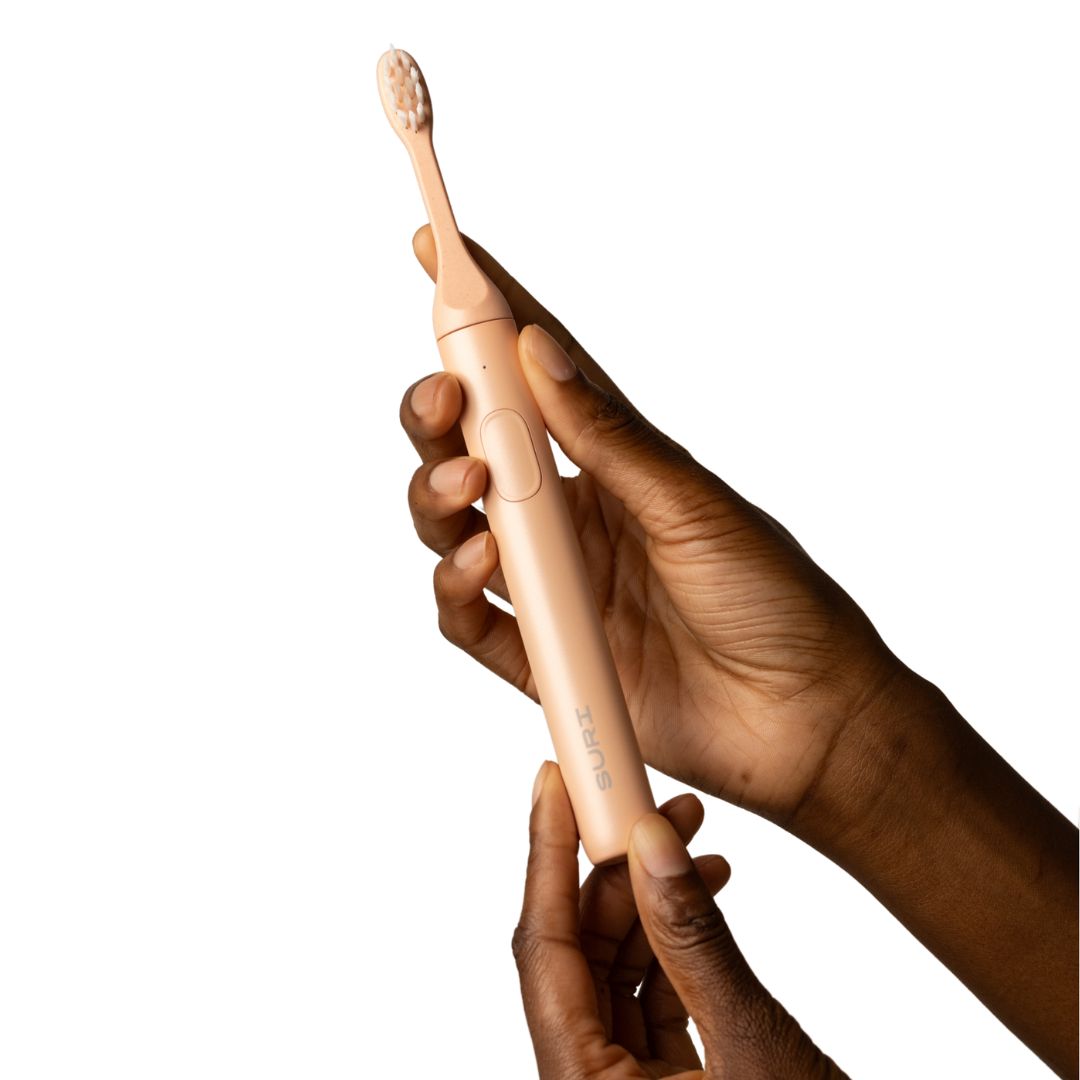Your mouth-gut axis is way more important than you think – how poor oral hygiene can impact your health
This one's worth reading.


Gut health has become a huge talking point in recent years. And as we become increasingly aware of the connection between the bacteria in our bellies and our wellbeing, you’ve probably given at least a little bit of thought to how the food and drink you consume is utilised by your body, not to mention the impact it has. But have you ever considered how your oral hygiene affects your gut health? Enter the mouth-gut axis, which experts are now saying has a big impact on your overall wellbeing.
“The gut is the epicentre of our health," says registered nutritionist and author, Jenna Hope. "It communicates with so many different areas of the body and therefore nurturing it is key for long term health." So, how exactly does overall gut health boost your overall wellbeing? According to our experts, the gut plays a key role in many of your body’s processes and responses including digestion, immune function, inflammation, and mental health. This means that your gut health has the potential to influence your physical health but also mood and stress levels, shares Ro Huntriss, registered dietitian and chief nutrition officer of Simple App. “A balanced gut microbiome also supports metabolic processes and helps maintain hormonal balance,” she says.
Let us explain. Our mouth is the gateway to the digestive tract, in other words, the passageway that allows your body to absorb nutrients and expel waste, not to mention house your precious gut microbiome. This means that your gut health isn’t only influenced by the food you put in your mouth, but by how you manage and care for your oral wellbeing, too.
It’s an area of oral microbiology that’s still being investigated, so research is quite sparse. However, a paper published in 2019 concluded that the oral microbiome may "have a great effect on the health of the gastrointestinal system."
Keen to prioritise your oral hygiene and gut health in 2025 but unsure where to start? The experts have some advice for you below. Eager to read more on the topic? We've got expert-led guides to unhealthy gut symptoms, gut health hacks, and the connection between gut health and weight loss, here.
The mouth-gut axis will be huge this year – your guide to boosting yours
What is the mouth-gut axis?
“The mouth-gut axis, also known as the oral-gut microbiome axis, refers to the relationship between the microbiomes of the mouth and gut and how they influence each other,” explains Huntriss.
And FYI, there are several key connections between these two environments. “Microbes from the mouth can pass into the gut, potentially disrupting the gut microbiome. This imbalance, known as dysbiosis, can lead to inflammation, trigger immune responses, and even impact broader aspects of health, including cardiometabolic health.”
Celebrity news, beauty, fashion advice, and fascinating features, delivered straight to your inbox!
Equally, as this recent 2023 study highlights, imbalances in the gut microbiome have the potential to influence oral health.
Why is good oral hygiene important?
You might think you know the answer to this one, but it's actually a little more comprehensive than you'd expect. Let the experts explain. “Like the gut, your mouth homes a balance of bacteria that are essential for oral health,” says Dr Alexandra Day, lecturer in aesthetic medicine, dentist at The Wellington Clinic and SURI advisor. This is because “organisms associated with health exist side-by-side with those associated with disease".
Not just that, but because teeth, unlike skin, do not shed, unwanted bacteria can build up on the surface of the teeth and enter the body via the digestive tract. “Maintaining a state of harmony within this population is therefore crucial to prevent the overgrowth of disease-associated bacteria and the development of dental diseases such as tooth decay and gum disease,” she goes on.
How can bad oral hygiene impact our gut health?
Now, onto the interesting part. Wondering how exactly poor oral hygiene can impact our gut health? As Dr Day explains, “when you have tooth decay or gum disease, you’re at higher risk of problems with your gut health because harmful oral bacteria can spread throughout the body through the sulcus (aka, where the tooth and gums meet) in your gum."
P. Gingivalis is a particularly harmful oral bacteria which can cause gum disease but can also stimulate an inflammatory response in other parts of the body, including the gut, shares the doctor. “The stimulation of white blood cells within the bloodstream puts them in a state of high alert and results in the release of damaging mediators called oxygen radicals and cytokines, which drives gut inflammation,” she explains.
9 tips for boosting your oral hygiene (and your gut health)
1. Consume adequate amounts of calcium, Vitamin D and phosphorus
“These nutrients play an important role in keeping your teeth healthy, which is vital for maintaining oral health,” says Hope.
Try this: She recommends quality dairy products, salmon, eggs and beans to increase your intake. “The recommendations in the UK are to supplement with 10ug of Vitamin D during the winter months.”
2. Get your fill of fibre
“Fibre is well known for its role in supporting digestion; and, prebiotic fibre acts as food for friendly bacteria in the gut, supporting a healthy gut microbiome,” says Huntriss. “A lesser known fact is that, as this 2016 study highlights, fibre intake is inversely associated with periodontal disease, so can have a positive impact on oral health too.”
30g a day is the current UK guideline for fibre intake, and you can find it in oats, wholegrains, vegetables and pulses.
3. Brush twice a day – and with an electric toothbrush
Dr Day recommends brushing teeth once during the day and once before bed, for two minutes each time. Though, wait 30 minutes after consuming acidic foods and drinks before brushing, so you don’t risk softening and wearing the enamel.
“Use smaller brush heads to reach tight areas, and hold the brush at 45 degrees where the teeth meet the gums as this is where most plaque will sit,” she says. “My preferred toothbrush is the sustainable SURI toothbrush.” Read our full SURI toothbrush review, here.
4. Use a non-abrasive, high fluoride toothpaste
Did you know? “Fluoride strengthens the outermost layer of enamel, increasing its resistance against tooth decay and acid erosion,” says Dr Day.
Try this: With that in mind, she emphasises the importance of using a suitable level of fluoride and amount of toothpaste for your age, and recommends that adults opt for a product with 1500 parts per million (ppm) fluoride. “Watch out for gritty or abrasive toothpaste which may cause unwanted wear of enamel,” she adds.
5. Eat fermented foods
Think yogurt, sauerkraut and kefir. “Consuming kefir has the potential to positively influence both the gut and oral microbiome,” says Huntriss. “It’s also a source of calcium, so will support the health of your teeth.”
6. Stay hydrated
Hope advises aiming for two litres of water a day. “Ensure you’re sipping regularly as this can help to flush away particles of foods which have been left behind,” she says. “This can also support adequate saliva production.”
Dr Day concurs. “Drinking water helps to lubricate teeth and stop food sticking, neutralise acids, and also improve saliva quantity and quality.”
7. Limit certain foods and beverages
We’re not in the business of telling you what you can and can’t consume, but there are a few items our experts recommend in moderation as they can impact both oral and gut health.
“A high sugar diet will encourage the growth of acid-loving bacteria like streptococcus mutans, which contribute to tooth decay and inhibit good bacteria,” says Dr Day.
For the fizzy drink lovers, unfortunately, your favourite beverages aren’t advancing your health. “They can contribute towards dental erosion and tooth decay, and can also alter the balance of microorganisms, and upset the good bacteria,” says Dr Day. Drinking alcohol and smoking, she says, have also been linked with the growth of bad bacteria and gum disease.
8. Prioritise recovery and rest
Stress can wreak all sorts of havoc in your body, including, says Dr Day, your mouth and your gut. She recommends taking steps to manage, and reduce, stress, and improve sleep quality.
Try this: “Aim for around eight hours of sleep a night,” she says. “If you sleep with your mouth open, you may be promoting the growth of bacteria in your mouth. Speak to your dentist or doctor about mouth taping.”
9. Get regular checkups with your dentist
We know it’s not everyone’s favourite pastime, but we can’t stress enough how important it is to visit your dentist for a checkup every so often. Dr Day advises at least one, ideally two, appointments a year.
And, of course, if you experience any symptoms associated with oral or gut issues, consult your dentist or doctor for further investigation.
Shop MC UK approved products now:

Dr Day recommends the SURI electric toothbrush, if you're in the market for a new one. "With its uniquely shaped head and ultrasonic technology, it’s a sleek and reasonably-priced brush that reaches some of the hardest-to-clean areas where plaque most often hides."

Abbi Henderson is a freelance journalist and social media editor who covers health, fitness, women’s sport and lifestyle for titles including Women's Health and Stylist, among others.
With a desire to help make healthcare, exercise and sport more accessible to women, she writes about everything from the realities of seeking medical support as a woman to those of being a female athlete fighting for equality.
When she’s not working, she’s drinking tea, going on seaside walks, lifting weights, watching football, and probably cooking something pasta-based.

